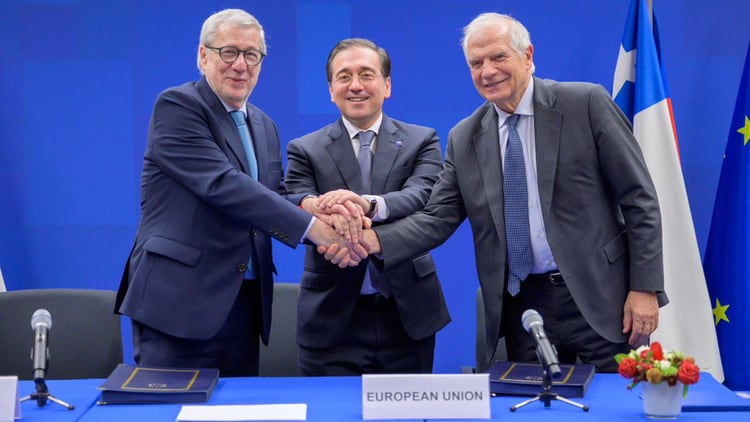Ane Barcos. Aquí Europa/Editored
The European Union and Chile formally sealed yesterday, still under the Spanish Presidency of the EU Council, the modernisation of the trade agreement that has united them for 20 years.
The political agreement was announced a year ago, but yesterday the signing took place in Brussels to modernise relations with Chile. The trade pact has now been signed in Brussels, once the ratification processes have been completed, at a ceremony attended by the European Commission’s Vice-President for Economic Affairs and Trade, Valdis Dombrovskis, the Chilean Foreign Minister, Alberto van Klaveren Stork, and the EU’s High Representative for Foreign Policy, Joseo Borrell. Also present on behalf of the Spanish Presidency were the First Vice-President of the Government, Nadia Calviño, and the Minister of Foreign Affairs, José Manuel Albares.
The Advanced Framework Agreement and the modernised Interim Trade Agreement seek to promote mutual benefits, foster economic growth and create new opportunities for SMEs. The agreement is also expected to contribute to the ongoing green transition on both sides.
Strengthening political and economic relations between the EU and Chile, as well as deepening cooperation and trade, are the fundamental objectives of the new agreement. It will effectively contribute to tackling emerging global challenges, such as the consequences of the Russian invasion in Ukraine, addressing issues such as global inflation, disruptions in supply chains and the energy crisis.
European Commission President Ursula Von der Leyen welcomed the news, noting that when she met with President Gabriel Boric in Santiago last June, the parties agreed to move forward to conclude these agreements before the end of the year. And so it has been, “they are already a done deal”, she said.
With this agreement, 99.9% of EU exports to Chile will be exempt from tariffs, while Chilean products will have “more flexible” access to the EU’s single market. Furthermore, thanks to the elimination of tariffs, the EU expects an increase in exports to Chile of up to 4,500 million euros.
Chile hopes to deepen trade “adding value by incorporating new materials”, according to a communiqué from the Chilean Foreign Ministry. It points out that the European Union represents an enlarged market of 448 million people, the third largest economy in the world.
The Chilean newspaper El Mercurio points out that since the first agreement came into force in 2003, trade between Chile and the EU has doubled. “After registering 19,299 million dollars in 2022, with an average annual growth of 4.5%, the EU has become Chile’s fourth largest trading partner after China, the United States and Mercosur”.
In addition, the EU is the leading foreign investor in Chile, especially in the area of services, and is the third regional destination for Chilean investments.
The Chilean newspaper indicates that “during 2022, a total of 2,079 companies exported to the EU, of which 36.3% correspond to SMEs; in the same year, this group of SMEs exported a total of 254.3 million dollars, 16.4% more than during 2021”.
Von der Leyen also stressed that this alliance will strengthen the EU’s connections with Chile, “the fifth largest economy in Latin America”. As she explained, they will work together on sustainable supply chains of critical raw materials, which is “a great opportunity for our clean technology industry and an important contribution to our open strategic autonomy”.
The Commission President underlined that Chile is a partner with which the European Union shares “common fundamental values and ambitions such as the defence of respect for human rights, gender equality and environmental protection. In this regard, she reiterated the commitment of both parties to decarbonisation. Proof of this is the fact that these guiding principles have been placed at the heart of the new agreements, which, as she assured, “will govern our trade and investment relations”, which could serve as a model for future EU trade agreements, she pointed out. Von der Leyen expressed her joy at “opening this new chapter with such a privileged and trusted partner”.
Executive Vice-President Dombrovskis said the signing “formalises a commitment that takes this close bond to a whole new level” and added that “in many respects, it marks an even stronger partnership between old friends”.
He reiterated the importance of this alliance “at a time of considerable geopolitical tension”. He noted that Russia’s war in Ukraine “has refocused attention on the need to forge closer alliances with trusted allies”.







